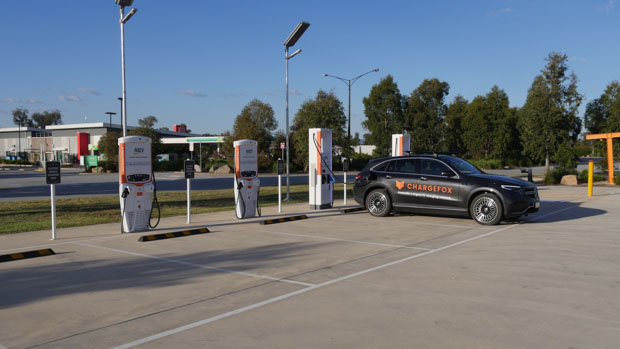-
Car Reviews
- All reviews
- Midsize SUVs
- Small cars
- Utes
- Small SUVs
- Large SUVs
- Large cars
- Sports SUVs
- Sports cars
- Vans
Latest reviews
- Car News
-
Car Comparisons
Latest comparisons
- Chasing Deals
Electric car owners used to Chargefox’s previous $0.40/kWh fees are in for a nasty shock from May 9
Chargefox, one of Australia’s largest electric car charger providers, has announced it will increase charging prices for its ultra-rapid charging stations – all chargers faster than 50kW speed.
As of May 9, charging fees will increase by a whopping 50 percent, from $0.40 per kWh to $0.60/kWh.
The increased cost means that, using the Chargefox network, driving 1000km in a Hyundai Ioniq 5 will cost about $120 when it previously cost about $80.
Chargefox’s decision to increase prices sees its fees match those of competing Australian EV charging firm Evie, which has commanded $0.60/kWh pricing on its ultra-rapid chargers for several weeks.
Further leaps in charging costs from the firms would bring the price of charging perilously close to the running cost of a petrol or diesel vehicle on a long road trip.
Chargefox markets that all energy for its ultra-rapid chargers is sourced from renewable electricity generation.
While pricing will impact the ultra-rapid chargers, for the slower 50kW chargers the pricing will remain unchanged.
EV owners with a Chargefox subscription included with the purchase of their vehicle will continue to enjoy the same discount (or complimentary charging) as before the price increase.
For instance, the Porsche Taycan, Audi E-tron, BMW i4 and BMW iX all include Chargefox charging in the purchase price of the vehicle.
One of the biggest bugbears with the Chargefox network is reliability, an issue Chasing Cars has experienced first hand when charging electric cars on test.
Chargefox’s flagship Sydney ultra-rapid chargers, located in the East Village mall at Zetland, have been broken for several months, with the charging firm blaming equipment provider Tritium for the woes.
Chasing Cars testing has revealed other Chargefox chargers between Melbourne, Sydney and Brisbane have spotty reliability with common faults including broken screens, plus app or RFID activation flaws.
The problems are not isolated to Chargefox, with a range of Evie-operated chargers also presenting issues. Many ultra-rapid chargers in Australia are built by Australian firm Tritium and spare parts are understood to be in short supply.
When the Tritium 350kW chargers work, they are among the gold standard in EV recharging, resupplying 300km of range to the Porsche Taycan in our testing in about 20 minutes.
Chargefox says it is building a much more reliable network of fast chargers and that this will be done by working with manufacturers on the supply of parts for station hardware, improving the turnaround time of outages at stations and increasing transparency with drivers about the situation regarding charging stations.
Chargefox says it is also working to improve its app functionality and inputting systems to help clear congestion at charging bays.
The company is also working to build a great network of partnerships to ensure more people get discounted charging along with expanding its charge network to over 5000 plugs by the end of 2025.
Latest news
About Chasing cars
Chasing Cars reviews are 100% independent.
Because we are powered by Budget Direct Insurance, we don’t receive advertising or sales revenue from car manufacturers.
We’re truly independent – giving you Australia’s best car reviews.



